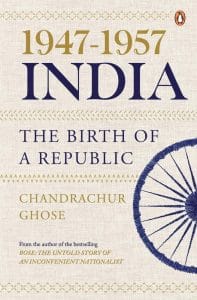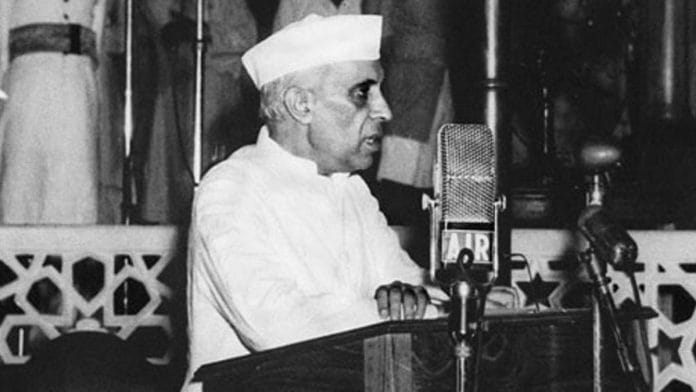Wavell’s selection of the invitees to the Simla Conference in June– July 1945 indicated how the British viewed the Indian political landscape. The purported objective of the conference, which was to form a new Executive Council ‘more representative of organised political opinion’, was transformed into the requirement for a council that ‘would represent the main communities and would include equal proportions of Caste Hindus and Moslems’.
The line separating the political and the communal was obliterated. Apart from Gandhi and Jinnah, as the recognized leaders of the two main political parties, the conference would have representatives of the scheduled castes, the Sikhs and the Europeans, and also the leader of the Nationalist Party in the Central Assembly. Wavell thus adopted a queer mix of political and communal approaches to resolve a political problem. For him Congress represented Hindu India and the Muslim League Muslim India. He felt that other political parties weren’t reasonable enough to be brought to the conference table.
In October 1944, Wavell had written to Churchill that there was ‘every reason to mistrust and dislike Gandhi and Jinnah, and their followers’ but ‘I can see no prospect of our having more reasonable people to deal with’. He informed the secretary of state for India that he ‘had no intention of handing over Executive Council to . . . those who would not support the war’.3 When the existing council suggested the inclusion of Syama Prasad Mookerjee of the Hindu Mahasabha among the invitees to the conference, Wavell accepted the suggestion, only to drop him within the next few days. On 9 June he informed the secretary of state:
[Governor of Bengal, Richard] Casey has just brought to my notice consistently anti-British and anti-Allies character of articles in Shyama [sic] Prasad Mookerjee’s paper Nationalist which was founded at end of 1944. Mookerjee is bitterly communal as well and would clearly refuse to co-operate with me or with other leaders. I have therefore decided to drop him.
Also read: Both Gandhi and Patel believed Hindus would flee than fight to protect themselves upon…
The absence of the leftist and radical leaders, most of whom were still in prison, left the political arena open to the Gandhian camp. Jayaprakash Narayan and Ram Manohar Lohia, the socialist leaders, were released on 11 April 1946, ten months after the release of the Congress Working Committee members. The ban on Forward Bloc, which was imposed on 22 June 1942, continued until June 1946 ‘in the interests of public safety and maintenance of public order’.5 The key leaders of the Bloc who were not in prison, such as Sheel Bhadra Yajee and R.S. Ruikar, opposed the Congress policy of office acceptance following the elections to the Central Assembly and the provincial legislatures.6 The party was, however, too weak and too dispersed to influence decisions by the Congress leadership. Systematic release of the several hundred political prisoners began only after Congress ministries were formed in the provinces.
Soon after his release in June 1945, Nehru took up the cudgels against the Communist Party of India (CPI) for its activities during the war. In several speeches and press conferences, Nehru accused the party of acting against the national movement. On 12 August, Nehru wrote to the British Communist leader Rajani Palme Dutt:
. . . at a time when there was bitter conflict between nationalism and the imperialist structure, they [the CPI] appeared before the people as acting on the side of the latter . . . Politically the fact that has gone most against them and aroused the greatest resentment is their attitude on the communal question. They have become full-blooded supporters of Jinnah’s demands (unspecified and vague as they are) and in the name of Congress-League unity they demand a complete surrender by Congress to Jinnah. Taking formal cognizance of the complaints received against the politics of the Communists June 1942 onwards, the Congress Working Committee appointed a sub-committee in September 1945 comprising Nehru, Vallabhbhai Patel and Govind Ballabh Pant to investigate into the matter. The sub-committee, in its report of 21 September 1945, came to the conclusion that ‘there is ample evidence on record before us to establish a strong prima facie case against the members of the Communist Party in the Congress’. The CPI was asked to respond to the charges within two weeks. Protesting against this move, P.C. Joshi, the general secretary of the CPI, asked all Communist members of the Congress to resign, except those who were members of the All India Congress Committee (AICC), so that they could respond to the charges. Joshi complained that although the CPI had consistently demanded the release of the Congress leaders for the past three years, the Congress leadership was now demonstrating ‘sectarian arrogance’, which, instead of winning India her freedom and building democracy, would ‘only divide and disrupt the freedom forces themselves’. Joshi further argued:
Their [Congress’s] declaration of fight against the Muslim League will only unleash forces of civil war, not forge the future Indian Union. To glorify the strength of the Congress and deny that of the League is to be blind. To demand self-determination from the British and to deny it to a section of our own countrymen is plain injustice. We do not think it is good patriotism to seek British intervention in our internal affairs, for it will lead not to Indian freedom, but to a British-planned imposed constitution.
Also read: Nehru once wandered around Delhi like a man in shock- horrors of Partition moved…
Accusing the CPI of mounting ‘a tirade against the Congress’ in the tone of ‘self-righteous arrogance’ instead of answering the specific charges, Nehru, Patel and Pant recommended the expulsion of all the Communist members of the AICC and instructed the Provincial Congress Committees to remove all Communist members from elective offices in December 1945. The clash between the Congress and the Communists soon became public over the mutiny of the ratings in the Royal Indian Navy in February 1946. Speaking at a public meeting in Bombay on 26 February 1946, Patel accused the Communists of misleading the people and exploiting their patriotism for resurrecting the prestige of the party. He asked: Who would take the anti-imperialist stance of the CPI seriously after they whole-heartedly cooperated with British imperialism during the Quit India movement?
The CPI faced more virulent criticism by Congress leaders during the provincial elections, particularly in Madras province, where they were organizationally strong. Asserting that India did not want the Moscow brand of communism, Kamraj Nadar, the president of the Tamil Nadu Pradesh Congress Committee, said that although the CPI was claiming to fight British imperialism, it would not hesitate to betray the country, as it did in 1942, if Russia and Britain settled their feud. Referring to attempts to disrupt his meetings, Kamraj said, ‘We fight for Swaraj to secure first and foremost freedom of expression. If Communists deny that freedom to their own comrades, I wonder whether they are fighting for Swaraj or Moscow Raj.’ ‘If Russians should decide on invading India,’ asked Pattabhi Sitaramayya, ‘will Communists fight them?’ Jayaprakash Narayan was blunter. Talking to the press in Delhi in April 1946, he declared, ‘I consider the Communists to be Russian fifth columnists and as such a perpetual danger to the country, irrespective of what policy they may be following at a particular moment.’
The election results clearly demonstrated that neither the communists nor the Hindu Mahasabha were in a position to influence the Gandhian wing or to beat them in elections. Wavell’s assessment of the political situation of the previous year still held good. ‘There is generally speaking no organised opposition to Congress amongst Hindus in British India (except possibly in the Punjab),’ he had written to the secretary of state for India in December 1945, ‘and nothing to put in its place if we suppress it. Neither the Communist Party nor M.N Roy’s Social Democrats have any influence.’
 This excerpt has been published with permission from Penguin Random House India.
This excerpt has been published with permission from Penguin Random House India.






